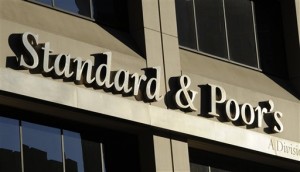
Standard & Poor’s has been accused Tuesday, Feb. 5, 2013, by the US Justice Department, which alleged that the rating agency knowingly exaggerated the ratings on financial securities, misrepresenting their true credit risk. AP PHOTO/HENNY RAY ABRAMS
NEW YORK—US Justice Department officials Tuesday accused Standard & Poor’s of fraud for inflating the ratings of mortgage bonds before the 2008 crisis, costing federally insured institutions at least $5 billion in losses.
Announcing a suit against S&P and its parent, The McGraw-Hill Companies, Attorney General Eric Holder said the rating agency knowingly exaggerated the ratings on financial securities, misrepresenting their true credit risk.
“Put simply, this alleged conduct is egregious—and it goes to the very heart of the recent financial crisis,” said Holder, flanked by justice officials from several states joining the suit.
“Today’s action is an important step forward in our ongoing efforts to investigate and punish the conduct that is believed to have contributed to the worst economic crisis in recent history,” Holder said.
The government accused the powerful credit rater of knowingly inflating its ratings on collateralized debt obligations in 2007 in order to win revenue from issuers.
S&P “knowingly and with the intent to defraud, devised, participated in and executed a scheme to defraud investors,” the civil suit, filed in California, said.
The suit targets S&P’s ratings in 2007 of CDOs, mortgages packaged into securities, that later plunged in value due to the US housing collapse, triggering the global crisis.
The complaint does not specify a financial penalty, but accuses S&P of wire fraud, mail fraud and financial institution fraud. The law provides a $1.1 million penalty for each violation, according to the complaint.
S&P promised a vigorous defense, saying the looming lawsuit would be “entirely without factual or legal merit.”
The Justice Department complaint lays out the case by noting that S&P “knew” its credit ratings were “material and relied upon by financial institutions” to assess risk.
S&P faced an apparent conflict of interest because it was dependent on issuers, who paid as much as $750,000 for issuance of some investment vehicles, according to the complaint.
S&P repeatedly pronounced itself “objective and independent” in company literature and in public statements.
Yet, the government argues that S&P repeatedly compromised its independence in executing ratings.
It lays out internal communications in which S&P considered the need to update its analytic models to keep up with the securities in the changing market, only to continue with the weaker models that permitted higher ratings to go through.
S&P’s modus operandi was to “limit, adjust and delay those updates” to favor issuers and “maintain and grow S&P’s market share and profits,” the complaint alleges.
S&P argued Monday that in 2007 and prior to that time, it had downgraded a number of residential mortgage-backed securities included in the CDOs ahead of other ratings agencies.
“With 20/20 hindsight, these strong actions proved insufficient—but they demonstrate that the DoJ would be wrong in contending that S&P ratings were motivated by commercial considerations and not issued in good faith,” it said.
S&P also said it was far from alone in its failure to predict the scale of the housing collapse.
That crash wiped hundreds of billions of dollars in value from mortgage securities, leading to the government having to step in and rescue major banks that had invested in them.
Up until last week, the Justice Department and S&P had held settlement talks. But the discussions ceased after the Justice Department said it would seek at least $1 billion to settle the case, according to the New York Times, which cited people who were briefed on the government’s plans.
S&P is a unit of McGraw-Hill, whose shares was 5.3 percent lower in morning trade after losing nearly 14 percent Monday.

